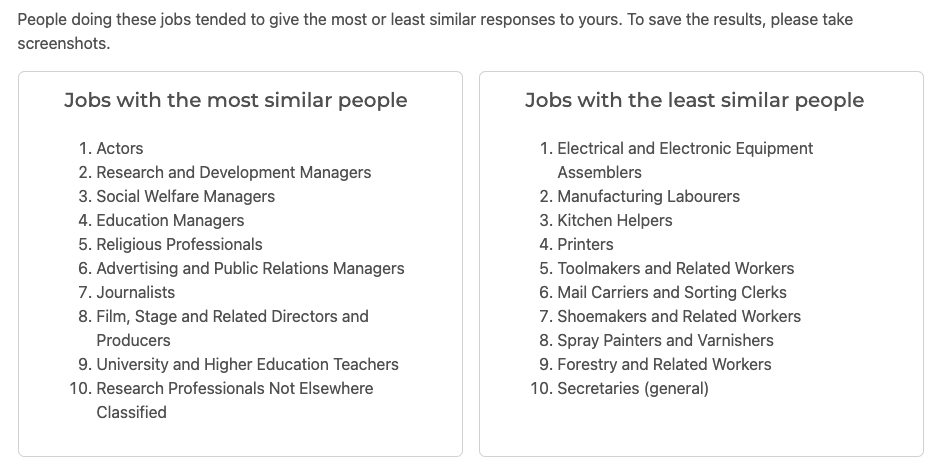
What occupation does your personality match?
In the latest issue of the Journal of Applied Psychology (April, 2025), the Editor’s Choice Feature Article is called Personality profiles of 263 occupations. The authors of this article collected occupation and personality trait information from a massive sample, and they used this info see if there are consistent group differences between people employed in different jobs.
The article is a good read for folks with professional knowledge and interest in organisational psychology. If this is you, check out the abstract below and follow through to the open access article (linked above).
Abstract
While personality trait assessments are widely used in candidate selection, coaching, and occupational counseling, little published research has systematically compared occupations in personality traits. Using a comprehensive personality assessment, we mapped 263 occupations in self-reported Big Five domains and various personality nuances in a sample of 68,540 individuals and cross-validated the findings in informant ratings of 19,989 individuals. Controlling for age and gender, occupations accounted for 2%–7% of Big Five variance in both self-reports and informant reports. Most occupations’ average Big Five levels were intuitive, replicated across rating methods, and were consistent with those previously obtained with a brief assessment in a different sociocultural context. Often, they also tracked the Occupational Information Network database’s work style ratings and clustered along the International Standard Classification of Occupation’s hierarchical framework. Finally, occupations with higher average levels of the personality domains typically linked to better job performance tended to be more homogeneous in these domains, suggesting that jobs with higher performing incumbents are often more selective for personality traits. Several personality nuances had intuitive occupational differences that were larger than those of the Big Five domains (explaining up to 12% variance) and replicated well across rating methods, providing more detailed insights into how job incumbents vary in personality. We provide an interactive application for exploring the results and discuss the findings’ theoretical and practical implications.
For everyone else, there is a feature of this article that I think you might enjoy. The authors have created an online application. The app prompts you to complete some basic demographic questions and to respond to many questions about your personality. Then it provides you with information about your scores on the Big Five personality traits: extraversion, neuroticism, agreeableness, conscientiousness, and openness to experience. It also shows you the kinds of jobs that most and least match your personality type (i.e. the roles that people with your personality profile most commonly work in).
I share my results here as an example – they show two lists of occupations, in which people doing these jobs tended to give the most and least similar responses to mine. The results are shown in an image, so people with sight can see what the app looks like. But I have duplicated the image content in the following text sections.

Jobs with the people most similar to me:
- Actors
- Research and Development Managers
- Social Welfare Managers
- Education Managers
- Religious Professionals
- Advertising and Public Relations Managers
- Journalists
- Film, Stage and Related Directors and Producers
- University and Higher Education Teachers
- Research Professionals Not Elsewhere Classified
This feels right to me – how nice when evidence-based insights feel good [smirks]. In high school, I struggled to choose between pursuing a career in acting, journalism, or social work / psychology. I ended up doing a double degree in social work and psychology, and then my PhD before moving into an academic role, and now am a research project manager and people manager. Many of my friends have roles similar to the ones in this list.
Jobs with the people least similar to me
- Electrical and Electronic Equipment Assemblers
- Manufacturing Labourers
- Kitchen Helpers
- Printers
- Toolmakers and Related Workers
- Mail Carriers and Sorting Clerks
- Shoemakers and Related Workers
- Spray Painters and Varnishers
- Forestry and Related Workers
- Secretaries (general)
This application is a fun and novel tool that makes the scientific findings of the research team tangible to the broader public. Thanks to the authors: Kätlin Anni, Uku Vainik, and René Mõttus.
Related resources
This Psych Attack podcast episode explains the impact of human personality traits on dog behaviour and the human-dog relationship.
This Psych Attack podcast episode explains how the dark tetrad of personality can help us understand cyber dating abuse.
This research article, Predictors of Trauma Reactions in TV News Camera Operators, was among the first to show the positive association between neuroticism and trauma reactions in a journalist sample.
